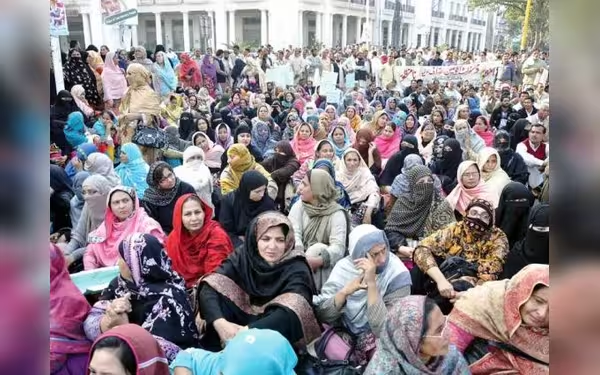Saturday, November 16, 2024 07:30 PM
Primary Teachers Protest in Peshawar for Upgradation
- Thousands of teachers demand position upgradation.
- Deadline set for notification issuance by October 31.
- Potential shutdown of 26,000 schools on November 5.
 Image Credits: urdupoint
Image Credits: urdupointPrimary teachers in Peshawar protest for position upgradation, demanding government action by October 31.
In recent weeks, the education sector in Pakistan has witnessed significant unrest as thousands of primary school teachers, including a substantial number of female educators, took to the streets to voice their concerns. The focal point of this protest was the Peshawar Press Club, where teachers gathered to demand the long-awaited upgradation of their positions. This movement is spearheaded by Azizullah Khan, the Provincial President of the All Primary Teachers Association (APTA), who has been vocal about the issues facing primary educators.
The backdrop of this protest is rooted in a promise made by the former provincial cabinet on January 17, which approved the upgradation of primary teachers along with other educational cadres. However, despite numerous discussions with Members of Parliament and government ministers, the Finance Department has been accused of providing misleading information to the government regarding the financial implications of this upgradation. Azizullah Khan emphasized that the total cost for the upgradation would amount to only 3 billion rupees, a figure he argues is manageable for the government.
During the protest, Khan set a clear deadline of October 31 for the issuance of the upgradation notification. He warned that if their demands are not met by this date, a massive sit-in is planned for November 5, 2024, which could see the participation of up to 100,000 primary teachers. Additionally, he indicated that a complete shutdown of 26,000 primary schools would commence on the same day, further highlighting the seriousness of their demands.
The teachers' demands extend beyond mere upgradation. They are also calling for regularization of their positions, the restoration of the Fargo option in promotions, and the resolution of inter-district and union council transfer issues. These concerns reflect a broader struggle for recognition and fair treatment within the educational system, which is crucial for the development of quality education in the province.
As the situation unfolds, it is essential to recognize the pivotal role that teachers play in shaping the future of the nation. Their commitment to education is invaluable, and addressing their grievances is not just a matter of policy but a necessity for the betterment of the educational landscape in Pakistan. The government must take these protests seriously and engage in meaningful dialogue to ensure that the voices of these educators are heard and acted upon. The outcome of this situation will not only impact the teachers but also the countless students who rely on them for guidance and knowledge.













